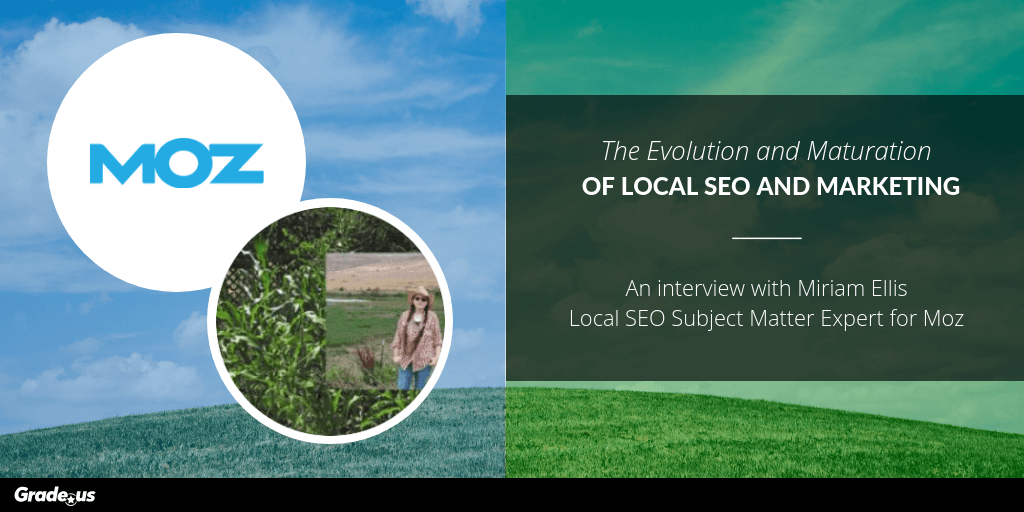Local search and local marketing is a burgeoning industry, yet it still flies under the radar for many small business and enterprises alike. Recently, I spoke with Miriam Ellis, the Local SEO Subject Matter Expert for Moz, who make local SEO easier for businesses at every level.
Miriam has been a local SEO expert for a while and has worked with many businesses of all sizes to help them grow their business with their local digital marketing. She's a wealth of insights and consistently contributes actionable and strategic blogs for Moz.com.
On the evolution of the local marketing industry in the 21st century
Garrett: Miriam, you've been familiar with local search and marketing industry for the past few years, what are some of the biggest changes that you've seen?
Miriam: 2019 marks my 16th year observing and marketing local businesses. Over that time, I’ve seen:
- Local businesses become more aware of the Internet’s key role in their marketing and consumer relations
- Google’s increased dominance of the space
- Local software and tools developed to automate time-consuming tasks
- Marketers embracing authenticity and quality as the most important factors that drive loyalty, both between agencies and clients and between clients and their customers
On how local search practitioners are adapting to the changes
Garrett: How are local search practitioners adapting to and taking advantage of these changes?
Miriam: Point for point, I see:
- Clients that are better educated and more willing to invest in local SEO
- A recognition that all local businesses must conform to a high degree to Google’s vision of local, like it or not
- Gradual software innovation — things are getting good here
- Smart marketers replacing short-term/non-consumer-centric gains with strategies that improve client and customer retention. However, Google’s lack of regulation allows spammers and scammers to have a field day
Garrett: How do you feel agencies have had to adapt to their client's needs and what advice would you give to local search and marketing practitioners for providing the most value to their businesses and clients?
Miriam: Knowing a client’s individual market is a wonderful competitive advantage. Do the homework! What works in one geo-industry may not be quite right for another.
For example, how can your client appeal to rural vs. metro customers? How will your strategy differ for a dentist vs. a credit union? How can you meet the needs of an independent business vs. an enterprise?
Some local SEOs specialize in working with just a few industries and really get to know these markets, but even then, the lengths one needs to go to for a small-town client will differ greatly from all that’s required in a major city.
Avoid assumptions and really study each market you enter with a client.
On the misconception that the local search industry is small
Garrett: The local search industry is growing at a staggering pace and digital marketing has become essential to local small businesses and yet, local search still feels like a relatively small niche community.
Why do you think that is? Do you expect that to change? Where do you see opportunities and how do we as an industry market it better to small business owners?
Miriam: I think this perception of smallness may stem from the fact that the pool of visible local SEO experts has remained a fairly small one. However, my role at Moz has acquainted me with the vast number of agency and in-house workers who are tasked with managing local SEO.
These may not be publicly recognized experts, but they are responsible for nearly all of the same work: researching, marketing, and reporting to stakeholders.
Local is, in reality, huge!
For small business owners, the difficulties have remained the same for years: time, skills, and budget. Reasonably priced software can seriously alleviate all three of these challenges, but I do have two additional suggestions, based on my own recent research.
First, agencies that have to turn away clients because budgets don’t cover the necessary work should invest in educating SMBs about exploring better funding options.
Right now, only one percent of the trillions of dollars Americans put into stocks and bonds reach small businesses, but localvesting/community investing can sometimes be an option. Rather than turning a business owner away, why not take two minutes to suggest they seek local funding opportunities? They’ll remember you took the time to share your resources with them, and may come back to your agency when they’re ready to invest in local SEO.
Second, I would urge the local SEO industry to become strong advocates for independent local businesses. Last summer, I did a deep dive at Moz into the Buy Local phenomenon and came away convinced that small businesses are the backbone of commerce.
Study up on organizations like AMIBA and ILSR and use your skills and voice to advocate for things like Small Business Saturday and other community-building events.
On developing local search marketing trends
Garrett: What trends are you seeing when it comes to local search marketing strategies and tactics? Are you seeing agencies, enterprises and small businesses planning, budgeting, and executing better than in years past?
Miriam: I’m definitely seeing more educated owners and marketers, but at the same time, we need clearer models for setting goals, analyzing data and proving ROI. Local search has become more complex and necessitates more sophisticated solutions. This is one of the things I’m most excited about at Moz right now: our engineers and developers are actively working to solve some of the longest-standing challenges in Local. In my view, the will to solve problems is the right mindset for the current state of Local.
On prioritizing local channels, based on value
Garrett: What do you think are the most important channels for local? Should local businesses be focusing on their website? Google My Business? Advertising? Social Media? Review management?
Miriam: If I had to order these by priority, I’d say:
1. Invest in customer service, as it will be felt in every aspect of your revenue and reputation, including reviews. Delight customers and fully manage the entire review funnel.
2. Invest in community building and accrue business associates, customers, links, and citations from it.
3. Google Business Profile efforts come next, with all kinds of features for promoting your business, including its basic information, menus, products, content, etc.
4. Websites underpin local rankings, make up localized organic rankings, and feed data to Google, so keep investing here.
5. Social media can be a useful tool for overcoming Google’s bias toward searcher proximity, enabling a business to engage audiences that are physically beyond the radius of local packs. It can also be a boon to brands that are willing to risk taking a stand on community/societal concerns. Showing solidarity with what your customers care about is the best social strategy I know.
On local search and marketing challenges for large enterprises
Garrett: Moz Local offers services for a lot of larger enterprises with tons of locations, what are some of the challenges that you feel big enterprises face when it comes to their local search and marketing efforts?
What types of company wide programs tend to be the most successful? Who should be in charge of those programs?
Miriam: Most Enterprise problems boil down to the challenges of communications and scale.
Someone at the company has a spreadsheet with all of the correct business NAP for the brand’s 1,500 locations, but does the person tasked with opening a Moz Local account have access to that spreadsheet?
An external PR firm is doing a “good neighbor”-type campaign for the brand, but did anyone set up a meeting for them to talk to the team in Denver, or Dallas, or San Francisco to be sure they are gathering true local expertise from the people who live and work there and really know life in that community?
I think the best enterprise efforts are the ones that can scale down to the nuances of a single location while also scaling up to meet national/international needs. And I don’t think businesses should put a single department in charge of such work.
Unless all relevant departments are on board, knowledge and opportunities may be overlooked. Internal communications are really key.
On setting goals for local search and marketing efforts
Garrett: When it comes to setting goals and reporting on results, what should agencies and businesses be looking for to evaluate their performance?
Miriam: Obvious metrics here would be KPIs like revenue, clicks-to-call, clicks-to-website, form submissions, etc., but I think one of the most useful ways of benchmarking progress is via trends over time.
I think reporting can get overwhelming and out-of-hand for clients if it focuses on things like day-to-day rankings and fiddly numbers.
Rather, what I like is reporting that shows movement across time for a business in the context of its competition.
Are we going up, down vs. the competition?
When we go up in any metric, over the course of several months, we can feel accomplishment. When we go down, it’s time to dig in, to audit and analyze to find out why that’s happening and create new strategies for a new scenario. But, of course, the bottom line is always revenue.
On the importance of online reviews
Garrett: We both know that reviews continue to grow in importance for local search marketing, what trends are you seeing with online reviews?
Do only Google reviews matter or do you think Facebook, Yelp and other industry specific review sites still offer significant value to local businesses?
Miriam: I strongly advocate for diversification in any review strategy.
While it’s true that Google-based reviews likely have the most impact on Google local rankings, I highly recommend reading Mike Blumenthal’s recent summary of a patent that shows how Google can associate sentiment with a business, regardless of source, even if that sentiment isn’t within a traditional review.
At the end of the day, your goal is to have people speaking well of your brand everywhere, and you want to be as much a part of that conversation as possible.
On practical review management strategy advice
Garrett: What's your best advice for strategy and tactics when it comes to review management in 2019?
Miriam: Two things here:
1. The “secret sauce” of reviews is customer service. Investing in developing consumer guarantees, staff hiring and training programs, and making complaint resolution accessible both on and offline will drive a business’s review content.
If Grade.us’ readers would like a breakdown of all of the components of stewarding consumer sentiment, I laid this out in What the Local Customer Service Ecosystem Looks Like in 2019. With the right strategy and a high level of awareness, customer-centric brands can be such tremendous winners!
2. I want to especially highlight the importance of owner responses to reviews, particularly in the Google environment. The Google Business Profile is a mixed blessing. It can shower a business with valuable leads, but there are parts of it that only Google controls (like People Also Search For) and many parts that are publicly editable (including by spammers).
It’s so visible for your brand, and can be a make-or-break asset. Because of this, you want to control as much of the GBP screen real estate as possible, and this means fully embracing owner responses to reviews.
Just think — all that free, highly visible space for your use!
How you handle a complaint from one customer signals to all other potential customers how well they will be treated by your brand if they have a problem. How sincerely you thank customers who leave positive reviews is a mini-celebration of customer appreciation that everyone can see.
On the love of local search marketing
Garrett: What's your favorite thing about local search marketing and what's one prediction for local search this year that you haven't shared yet?
Is there anything else you'd like to share about local search marketing, online review management or just the industry that you think the Grade.us audience should know?
Miriam: My love of local SEO is rooted in civics. How awesome is it that we’re able to help communities and travelers become aware of all of the services available in a given locale? We’re basically building connections between people when we build the online mirror image of towns and cities, whether the end result is informational, transactional, societal, etc.
Our work helps neighbors find goods they need, support they need, and opportunities to participate in civic life. It’s the real-world aspects of our work as local SEOs that have kept me continuously engaged.
One prediction I haven’t really gone into elsewhere:
I think any agency that’s focusing on the greener niches of commerce is setting themselves up for success. Renewable energy, in particular, is creating a stunning number of jobs in the US, with departments like BLS predicting amazing growth in the coming years. An agency could also focus on related industries, like EVs, sustainable agriculture, green construction, etc. My state just passed a law that all new homes have to have solar panels.
If I were just starting out in the business, I would be very tempted to specialize in these types of clients and would feel awfully good about signing into work every day!
Garrett: Thanks for taking the time to speak with me! We love Moz's content as well as your local SEO and marketing insights and articles on the Moz blog!
About the Author
Garrett Sussman
Garrett is the Head of Marketing at Grade.us, an online review management and marketing platform. When he's not crafting content, he's scouting the perfect ice coffee, devouring the newest graphic novels, and concocting a new recipe in the kitchen.









